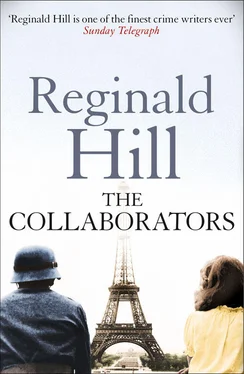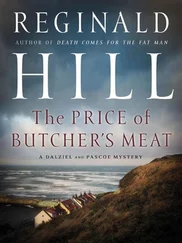‘Nice to meet you,’ said Valois. ‘Excuse me.’
‘I shouldn’t bother,’ repeated the lawyer as Valois opened the door on to the platform. ‘I presume you’re going to make a fuss about the chap they’ve just shot? I’ll tell you his story. His papers were obviously forged. He made a run for it and got shot. He’ll turn out to be a blackmarketeer, or an unregistered Jew, or perhaps even an enemy agent. All you’ll do is draw attention to yourself and get either yourself or, worse still, the whole train delayed here a lot longer.’
‘That’s bloody cynical!’ snapped Valois. ‘I thought you were famous for fighting the underdog’s battles.’
‘Against the law, not against an army,’ said Delaplanche. ‘Against an army, all the underdog armed with the law does is get fucked!’
He smiled with the complacency of one who was famous for his earthy courtroom language. On the platform German voices were commanding the passengers back on to the train. Delaplanche picked up a newspaper and began reading it. Feeling defeated, Valois stepped down on to the platform but only to return to his own compartment.
His gloom lasted till the train pulled into the station at Vichy, but lifted at the sight of his sister, long black hair streaming behind her, running down the platform to greet him.
They embraced. Since he last saw her she’d become a young woman and a very beautiful one. She tucked her arm through his in delight and led him to where their mother was waiting.
‘Where’s father?’ asked Valois as they approached.
‘Busy. He sends his apologies.’
‘No. I understand. Without his constant efforts, the country would be ground down under the conqueror’s heel.’
‘Shut up and behave! I don’t want my birthday spoilt!’
He just about managed to obey the injunction, but there were difficult moments. Vichy disgusted him with its opulent façades all draped with tricolours. Everywhere he looked, red, white and blue, like make-up on a leprous face. He preferred the stark truth of those swastikas he could see from his office window flapping lazily over the arcades of the Rue de Rivoli. The people, most of them, were the same. ‘Like characters on a film set,’ he told his sister. ‘Or worse. Vichy is like a folk-tale village in a pop-up book. Only a child thinks it’s really magic.’
‘I agree,’ said Marie-Rose. ‘It’s so boring here. That’s why I want to come back to Paris with you!’
He looked at her in alarm. This was the first he’d heard of this idea and the more he thought about it, the less he liked it. In Paris, by himself, his decisions only concerned himself; it was a time of danger and it would get worse.
He tried to explain this to Marie-Rose and they quarrelled. But by way of compensation, he found an area of common ground with his father who was absolutely opposed to any such move.
Indeed he and his father kept the peace till the time came to part. His mother presented him with a bag full of ‘goodies’ and his father with a piece of paper.
‘It’s a permit to use the car, the Renault. I’ll want to use it myself whenever I come to Paris and it’s absurd for it to stand in the garage all the time, so I got a permit for you too.’
His instinct was to tear the paper in half and it showed on his face.
‘What’s the matter?’
‘Father, have you any idea what it’s like in Paris? The kind of people who’re still driving around in cars, well, they’re not the kind of people I want to be associated with. There’s still a war on, father, believe me!’
‘No, there’s an armistice on, you’d better believe me!’ snapped Léon Valois. ‘Face up to reality, even if you don’t like it. The facts are that the Germans are in control and likely to stay that way. With or without us, they’ll rule. Without us…well, I dread to think how it might be. With us, we can restrain, influence, perhaps eventually control! They’re a rigid race, good for soldiering, poor for politics. Believe me, Christian, my way’s the only way to build a future for France!’
He spoke with passionate sincerity but there was no place for them to meet. The one good thing about their quarrel was that it reunited him with his sister just as their row had temporarily brought him closer to his parents. She kissed him tenderly at parting and asked, ‘Is it really so awful under the Boche? I worry about you.’
‘Oh it’s not so bad really,’ he assured her.
‘No? Well, no matter what you say, one day I’ll surprise you and come and see for myself!’
She grinned in a most unseventeen-like way and hugged him once more with a childish lack of restraint before he got on the train.
He leaned out of the window and waved as long as he could see her on the platform. As he turned to sit down, the compartment door opened.
‘We meet again,’ said Delaplanche. ‘How was your trip? What did you think of Vichy?’
His eyes glanced at Madame Valois’s bagful of expensive cans, as if he were reading the labels through the cloth, and when they returned to Valois, he felt as if the man could see through to the car permit in his pocket.
‘I’ll tell you what I thought of Vichy,’ he said savagely.
Delaplanche listened in silence. Finished at last, Valois waited for approval.
‘I hope you’re not always so indiscreet,’ was all the lawyer said. ‘Especially with strangers.’
‘Strangers? But…’
‘What do you know of me?’
‘I know your reputation. I’ve read about, listened to you. I know you’re a man of the people, a socialist, some even say a…’
‘Communist? Yes, some do say that. Of course, if I were a communist, that would put me in the German camp, wouldn’t it?’
‘No! On the contrary…’
‘But Russia and Germany have a non-aggression pact.’
‘Yes, but that hardly means the communists support the Nazis!’
‘No. But wasn’t it enough to stop you from joining the communists just when you were teetering on the edge?’
The paper went up again. And the rest of the journey passed in silence, with the lawyer reading and Valois brooding on the man’s apparent detailed knowledge of his own background.
Their farewells in Paris were perfunctory. Valois felt tired yet restless. It had been an unsettling weekend and it was with a sense of relief and homecoming that he entered the apartment building. Perhaps his outrage at the idea of the car permit ought to extend to his use of his parents’ large well-appointed flat, but he was glad to find his mind could accommodate this as comfortably as it accommodated him.
The old lift had become an uncertain vehicle with lack of maintenance and power irregularities, so he headed for the staircase, ill-lit by a shrouded bulb to comply with the black-out regulations. The apartment was one floor up. He could hear a distant wireless playing music. It was a lively popular piece, but the distance, the hour and his own mood made it a melancholy sound. He sighed as he reached his landing.
Then fatigue and melancholy vanished in a trice, for terror lets no rival near the throne. There was a man crouched in the shadow of his door with a submachine gun under his arm. It was too late to retreat. The waiting man had seen him.
‘Monsieur Christian Valois?’
‘Yes.’
‘I’ve got a message for you.’
The man moved forward into the dim light. And the machine gun became a wooden crutch under his left arm. And the lurking assassin became a haggard, grey-haired man in a baggy suit.
‘A message? Who the hell from?’ demanded Valois, trying to cover his fear with aggression.
‘A friend,’ said the man. ‘Jean-Paul Simonian. Can we go inside? I’m dying of thirst!’
Читать дальше












